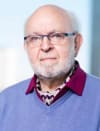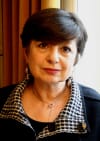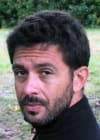
Talks in english
-

-

Le défi épistémologique de l’intégration entre la systématique et le reste de la biologie
La systématique donne, de fait, le système de référence de la biologie permettant de désigner ses objets, mais cet état de fait manque d'une intégration conceptuelle, épistémologique et méthodologique. Des domaines comme la génétique des population, l'écologie théorique, la biologie moléculaire ou la biologie des systèmes, en effet, s'appuient sur les relations causales synchroniques chez les être vivants. Ceci est particulièrement clair lorsque l'on considère leurs modèles mathématiques, largement hérités de la physique pour ce qui est de leurs structures et de leurs épistémologies. Surmonter cet obstacle épistémologique suppose de repenser le cadre théorique de la biologie comme un cadre épistémologiquement hybride, entre cadre historique et cadre relationnelle et synchronique, et de développer une écriture théorique et des méthodes adaptées.
-

Biology lies between historical and relational frameworks
-

Spherical cows and bipedal goats: Perspectives on mathematical models in biology
This event aims to take a step back and reflect on everyday mathematical modeling. We aim to organize a discussion on the diversity of this practice in biology and the homologies in current models. We wish to center those discussions around two related problems. First, given that the general reference system of biology builds on a notion of novelty to classify living beings, how can we use mathematical structures (using predefined spaces of possibilities) to describe living beings while avoiding contradiction? Is it reasonable that many of these practices do not even consider the organization of the organisms? Second, if models can be considered as instruments that contribute to shaping scientific reasoning, is their inscription within broader theoretical frameworks (not) necessary? Are data-based approaches sufficient to understand the living, or should theoretical and methodological jumps be performed? Is the perspective of the National Research Council sound when it states that not all New Biologists are now, or will in the future be, biologists? How to take mathematics and modelling seriously and, at the same time, avoid the disruption of biological knowledge by the fetishization of those tools?
-
Disruptions in biology: Theorizing a hallmark of the anthropocene
Biologists often use the term "disruption" informally to describe the effects of detrimental anthropogenic causes. A proper concept of disruption should be distinct from perturbations or, in ecology, from generic disturbances. We illustrate this with examples from ecology, using the case of plant-pollinator networks, from organismal biology, with endocrine disruptors, and at the interface of psychological and cognitive development with digital media and young children. Specifically, we argue that understanding disruptions requires the articulation of historical and relational reasoning. The object of disruption, such as endocrine regulation or seasonal synchrony between plants and pollinators, is a specific property coming from history that is disturbed in a new, random way, leading to a loss or degradation of this specificity. Moreover, initially, this specificity plays a specific relational role, typically a functional one. This role is lost or impaired by the disruption, which explains the disorganization characteristic of disruptions. In our view, however, disruptions are a normal part of the evolutionary process. What is severely detrimental in the Anthropocene is the accumulation of disruptions at a pace that exceeds the ability of living entities to overcome them.
-

Theory and theorization in the sciences
To a large extent, the question of theoretical frameworks in the sciences has been neglected (or poorly treated) in philosophy. In parallel, we argue that scientists themselves are currently neglecting this question, and we will show the consequences of this situation in biology. We will then provide elements of the definition of scientific theories, which are partly grounded in the activity of theorization itself. We will articulate this discussion with the question of the function of theories and theorization in the sciences.
-
Disruptions: A specific kind of disorganization
Biologists often use the term disruption more or less informally; however, this notion is increasingly used to describe the effects of detrimental anthropogenic causes. We argue that disruptions are distinct from perturbations or, in ecology, from generic disturbances. We illustrate this with examples from ecology using the case of plant-pollinator networks and organismal biology with endocrine disruptors. Specifically, we argue that understanding disruptions requires the articulation of historical and relational reasoning. The object of disruption, such as endocrine regulation or seasonal synchrony between plants and pollinators, is a specific property coming from history that is disturbed in a new way, leading to a loss or degradation of this specificity. Moreover, initially, this specificity plays a specific relational role, typically a functional one. This role is lost or impaired by the disruption which explains the disorganization characteristic of disruptions. In our view, however, disruptions are normal processes in evolution. What is severely detrimental is the current accumulation of disruptions at a pace that exceeds living entities' ability to overcome them.
-
Concepts and principles for the new biology: Development, disruption and normalization
During the first 25 years of the 21st century, we witnessed a resurgence of Organicism. This process is characterized by the return of the organism as a central biological entity and the increasing investigation on purpose and normativity at this level.
Simultaneously, the issue of the vulnerabilities of living beings and their numerous disruptions is escalating in urgency. The need to comprehend these disruptions, and how living beings adapt to them, is pressing. Organicism, with its systemic approach to disruptions and its focus on organisms’ normativity, is the most suitable framework for this understanding.
In this session, we will:
1) explore the epistemological role played by the morphogenetic field concept in the studies on the etiology of tumors in the early 20th century and its resurgence in the organicist conception of cancer as development gone awry (presented by Claudia Gadaleta, Paris 1 Sorbonne Panthéon - IHPST, Paris, France),
2) argue that a properly fleshed-out concept of disruption describes the effects of a significant category of detrimental anthropogenic causes in organisms and ecosystems. Understanding disruptions requires articulating historical and relational reasoning, which is a hallmark of recent theoretical developments (presented by Maël Montévil, Centre Cavaillès, Ecole Normale Supérieure, Paris, France)
3) argue that disruption causes a loss of function. The organismal agency may overcome disruption by acquiring novel functions, a process we call normalization. We will discuss two examples: i) how young quadrupeds that lost the function of their forelimbs teach themselves to walk as bipeds, and ii) cancer, a disease usually perceived as irreversible but known to regress spontaneously by normalization (presented by Ana Soto, Tufts University, USA and Centre Cavaillès, Ecole Normale Supérieure, Paris, France). -
Organization and variation as theoretical principles for biology
-
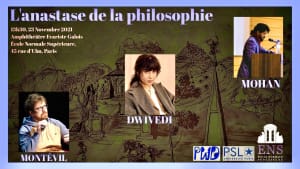
The concept of field in philosophy
-
Physiology and historicity: Re-entangling the biological, the ecological and the social
Depending on the theoretical and epistemological stance in biology, the relations between the biological and social change in nature. A reductionist stance, for example, genocentrism, focuses scientific investigations on a specific part of the organism - then, the social stands, at best and by definition, in the outskirts as far as biology is concerned. On the opposite, the perspective we are elaborating for reasons internal to biology considers biology at the crossroads of historical and relational epistemologies. The object's definition is never purely based on synchronic relations, like in physics. Instead, biological objects are historical and contextual. Cultural or social determinations can enter the biological picture, more or less strongly depending on specific situations. For example, taste is a phenomenon that involves specific biological structures (taste buds, olfactory receptors), and one may think that it is independent of society. Food pairing studies showed instead that the way to perform associations depends on the culture. Of course, historicity also means that other receptors can also creatively be recruited, which is the case with the capsaicin of chili pepper that triggers pain receptors.
-
The closure of constraints in practices
What understanding does the closure of constraints bring about a biological system in practices? Without discussing particular cases, one cannot answer this question. The goal of this workshop is to bring together and synthesize individual modeling experiences in physiology and ecology to establish perspectives of research collectively regarding organization in biology, sensu closure of constraints.
This workshop is intended to a specialized audience. We encourage speakers to present models or modeling methods, and share critical reflections on their work and the difficulties encountered. Identifying achievements, open questions, perspectives, and experimental, conceptual or technical difficulties is the main goal of this meeting.
Additionally to relatively short Q&A sessions, a general discussion will synthesize the main points raised during the day. This synthesis will be transcribed and shared with the participants after the workshop. -
Disruption of plant-pollinators interactions
-

What can be democracy?
-
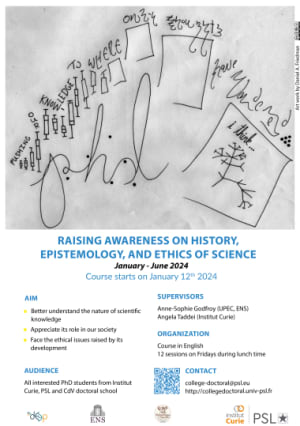
Two links between epistemology and ethics
-
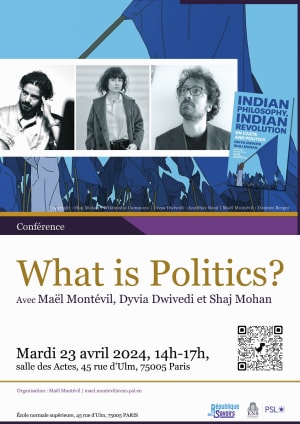
What is politics?
Politics is the fight for freedom; freedom does not exist outside of the struggles for it. Freedom is neither transcendent infinite being nor is it an Idea. Since the object of politics is not an Idea, there is no universal form for politics. The péjoration of politics, “politics” as a culture of lies and manipulations for gaining power, presupposes a non-political ideality or an anti-political totality. When philosophy commences otherwise than its ethno-history through an other beginning of philosophy politics is already opening a collective anticipation of freedoms unknown. For that very reason, unknown dangers await our political future.
-

The identity of organisms from an organizational perspective
-

Disruption of ecosystems and the vulnerability of biological organizations
-

Contributive research in saint-denis: Addressing the disruption of baby and toddler development by digital media
-
Organization & self-organization



